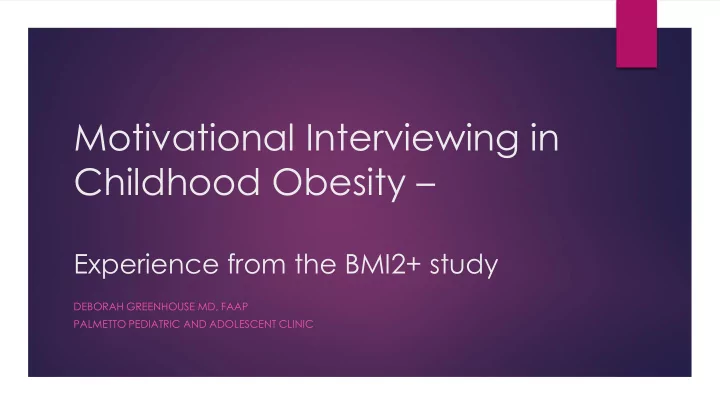

Motivational Interviewing in Childhood Obesity – Experience from the BMI2+ study DEBORAH GREENHOUSE MD, FAAP PALMETTO PEDIATRIC AND ADOLESCENT CLINIC
Childhood Obesity in South Carolina As of November, 2016: 14.2% of children age 2-4 years in the SNAP and WIC programs were overweight 12.6% of children age 2-4 years in the WIC program were obese 16.8% of adolescents were overweight 13.9% of adolescents were obese
Initial BMI studies Compared motivational interviewing to standard care for childhood obesity. Included assistance from local dieticians. Results- The combination of Motivational Interviewing provided by pediatricians and local dieticians did result in a statistically significant decrease in BMI percentage. The persistence of this change over time is not yet known. Barriers to dissemination include availability of dieticians and availability of training for pediatricians.
What is the BMI 2+ study Population Effects of Motivational Interviewing on Pediatric Obesity in Primary Care Randomized (by practice) controlled study comparing usual practice with motivational interviewing provided by both pediatricians and dieticians. Initially targeted children ages 3 through 7 years old. Later expanded to include children through 10 years old. Pediatrician training involved a full 2 day on site training program. 6 phone sessions with a trained dietician who then communicates with the pediatrician.
What Motivational Interviewing is NOT
What Motivational Interviewing IS- the Basics Patient centered/ Family Centered Explores family motivation and helps to resolve ambivalence Helps the patient/ family to develop autonomy Uses importance and confidence rulers to gauge readiness for change.
Motivational Interviewing- The Basics Open ended questions Reflective listening Identify the patient/family’s goals and motivations Roll with resistance Comfort the afflicted/ Afflict the comfortable Ask permission before offering information Establish a team approach
Successes of Motivational Interviewing approach Family takes ownership of the process Family is working on a goal that they feel they can achieve Family and pediatrician create a partnership The intervention involves and hopefully motivates the whole family
Barriers to Motivational Interviewing for Childhood Obesity High no show rate Financial barriers- insurance copays or high deductibles food deserts Lack of access to safe places to exercise Some families are simply in a pre-contemplative stage
Where do we go from here? Completion of BMI 2+ study Public Health interventions- Eliminate food deserts and ensure access to safe places for children/families to exercise Advocate for insurance coverage for care related to obesity Incorporate motivational interviewing skills into daily practice for obesity, smoking, etc. Anything that involves lifestyle changes. And remember…
Resources CDC Division of Nutrition, Physical Activity and Obesity South Carolina State Profile: https://www.cdc.gov/nccdphp/dnpao/state-local- programs/profiles/south-carolina.html Motivational Interviewing and Dietary Counseling for Obesity in Primary Care: An RCT. Kenneth Resnicow, PhD et al, PEDIATRICS Volume 135, number 4, April 2015
Recommend
More recommend